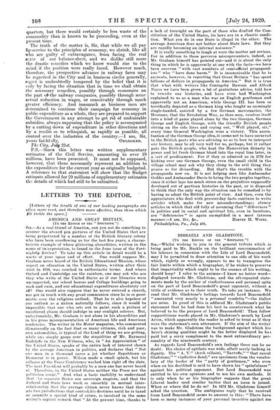LETTERS TO THE EDITOR.
[I etters of the length of one of our leading paragraphs are often more read, and therefore more effective, than those which fill treble the space.]
AMERICA AND GREAT BRITAIN.
[To THE EDITOR OF THE " SPECTATOR.".1 SIR,—As a real friend of America, can you not do something to counter the absurd pen pictures of the United States that are being perpetrated by a number of the British literary colony who have been overflowing us for the last five years, a charac- teristic example of whose glittering absurdities, written in the name of interpretation, is found in the June issue of the Fort- nightly Review? To take up this article in detail would be a waste of your space and of effort. One would suppose Mr. Graham never heard of the British Educational Mission, whose report on education in the United States, written after their visit in 1918, was couched in enthusiastic terms. And where Oxford and Cambridge see the rainbow, one may ask who are they who write of the United States as if our libraries were unsupported, our school houses and College buildings going to rack and ruin, and our educational expenditures absolutely cut off? One would also suppose that he never entered a church, nor got in touch with any great communion since he is so pessi- mistic over the religious outlook. That he is also hopeless of our outlook as e nntion naturally follows, since it would be impossible that one who sets out to paint such a picture of unrelieved gloom should indulge in any sunlight colours. But, unfortunately, Mr. Graham is not alone in his absurdities and in his gross misrepresentation of American life and American tendencies. The writer in the Motor magazine, who commented ill-naturedly on the fact that ED many citizens, rich and poor, own automobiles, is typical of the kind of thing we are getting, while ens simply gasps over the stupidities of Mr. Raymond Radclyffe in the New Witness, who, in "An Appreciation" of the United States, speaks of the entire lack of interest shown by the average American in politics, and declares that "Not one man in a thousand cares a jot whether Republican or Democrat is in power. Wilson made a small splash, but his collapse at the Peace Conference washed him right off the slate. The next President will probably he a man one has never heard of. Therefore, in the United States neither the Press nor the politician count." And what a basic inability to understand that 'he separate States are sovereign empires, and that the Federal and State laws work so smoothly in mutual inter- relationship that the average citizen never knows that there are two jurisdictions that controthis destinies until he is taxed or commits a special kind of crime, is-involved in the same writer's sapient remark that "At the present time, thanks to
a lack of foresight on the part of those who drafted the Con- stitution of the United States, its laws are in a chaotic condi- tion. What you do in one State is illegal in the other. The average American does not bother about State laws. But they are rapidly becoming an infernal nuisance."
It is really something to laugh at were the matter not serious. For in addition to these perverse misrepresentors, indeed, as Mr. Graham himself has pointed out—and it is about the only thing in which he is apparently at one with the facts—we have been overrun "with vast numbers of semi-official propagand- ists" who " have done harm." It is inconceivable that he is accurate, however, in reporting that Great Britain "has spent billions of dollars in propaganda in America." But it is true that what with writers like Coningsby Dawson and Alfred Noyes we Lave been given a lot of gratuitous advice, told how to rewrite our histories, and have even had Washington explained to us as a man who was an English gentleman and apparently not an American, while George M. has been so terrifically depicted as a German king who fought us seemingly single-handed, assisted by a few German mercenaries, the Hessians, that the Revolution War, as thus seen, resolves itself into a kind of game played alone by the two Georges, German George and English George, with the friendly British people sitting on the side lines and crying out, "Well played, sir," every time General Washington wins a victory. This accen- tuation of the German George idea, it seems not to have occurred to the British poets who are advising us as to how to interpret our history, may be all very well for us, perhaps, but it rather puts the British people, who kept the Hanoverian dynasty in power and let fresh German blood into the royal line later, in a 'sort of predicament. For if they so admired us in 1776 for kicking over one German George, even the small child in the village school may ask why they clung to the evil thing they praise us for discarding. But that's the trouble with the propaganda now on. It is not helping men like Ambassador Geddes and Ambassador Davis to bring the two peoples together, since it either lays too much stress on the prejudices supposedly developed out of partisan histories in the past, or is disposed to think that the only way the situation can be remedied is by having us adopt the British point of view. And then, even the appreciators who deal with present-day facts continue to write articles which make for new misunderstandings; clumsy articles in which that old folly of assuming that " differences" in politics and in social and spiritual life, even in locutions, are "deficiencies" is again exemplified in a most fatuous


































 Previous page
Previous page